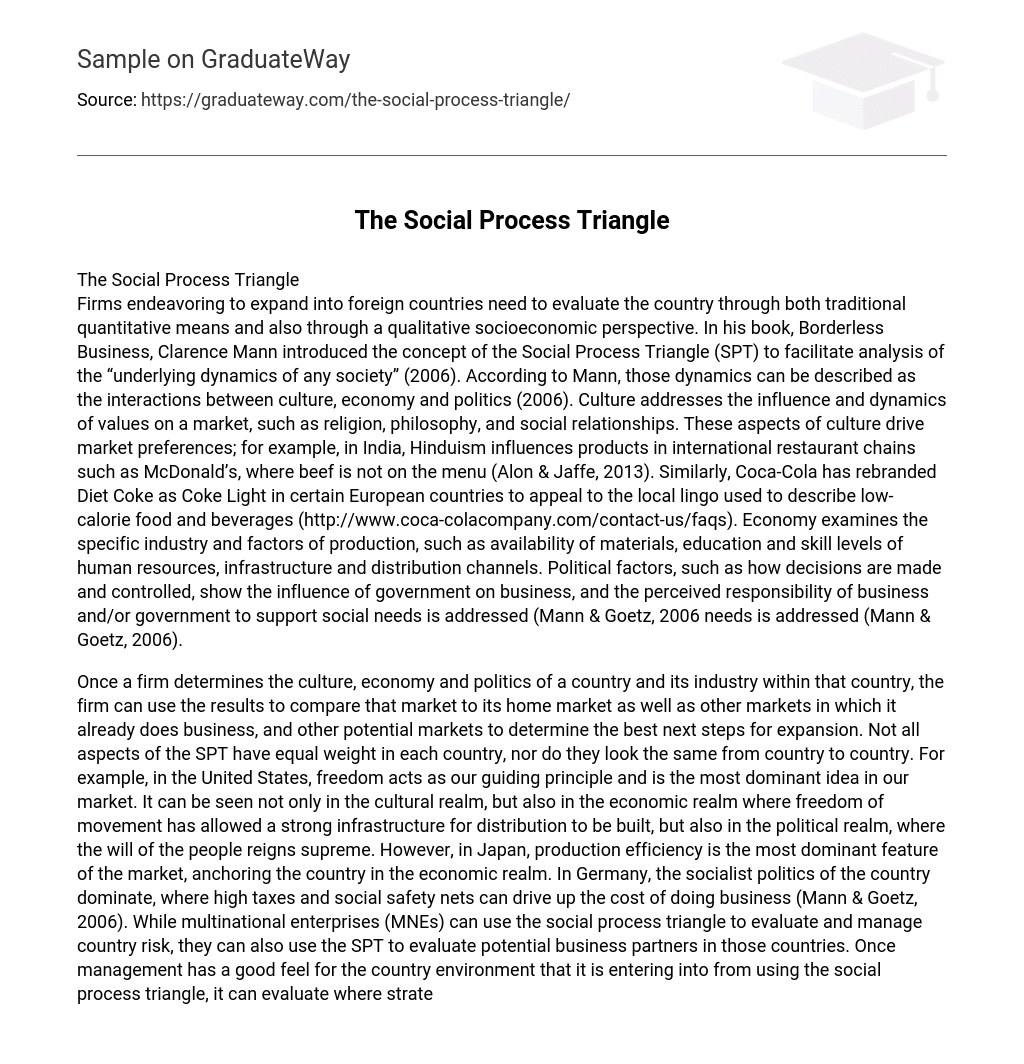Firms endeavoring to expand into foreign countries need to evaluate the country through both traditional quantitative means and also through a qualitative socioeconomic perspective. In his book, Borderless Business, Clarence Mann introduced the concept of the Social Process Triangle (SPT) to facilitate analysis of the “underlying dynamics of any society” (2006). According to Mann, those dynamics can be described as the interactions between culture, economy and politics (2006). Culture addresses the influence and dynamics of values on a market, such as religion, philosophy, and social relationships. These aspects of culture drive market preferences; for example, in India, Hinduism influences products in international restaurant chains such as McDonald’s, where beef is not on the menu (Alon & Jaffe, 2013). Similarly, Coca-Cola has rebranded Diet Coke as Coke Light in certain European countries to appeal to the local lingo used to describe low-calorie food and beverages (http://www.coca-colacompany.com/contact-us/faqs).
Economy examines the specific industry and factors of production, such as availability of materials, education and skill levels of human resources, infrastructure and distribution channels. Political factors, such as how decisions are made and controlled, show the influence of government on business, and the perceived responsibility of business and/or government to support social needs is addressed (Mann & Goetz, 2006 needs is addressed (Mann & Goetz, 2006).
Once a firm determines the culture, economy and politics of a country and its industry within that country, the firm can use the results to compare that market to its home market as well as other markets in which it already does business, and other potential markets to determine the best next steps for expansion. Not all aspects of the SPT have equal weight in each country, nor do they look the same from country to country. For example, in the United States, freedom acts as our guiding principle and is the most dominant idea in our market. It can be seen not only in the cultural realm, but also in the economic realm where freedom of movement has allowed a strong infrastructure for distribution to be built, but also in the political realm, where the will of the people reigns supreme.
However, in Japan, production efficiency is the most dominant feature of the market, anchoring the country in the economic realm. In Germany, the socialist politics of the country dominate, where high taxes and social safety nets can drive up the cost of doing business (Mann & Goetz, 2006). While multinational enterprises (MNEs) can use the social process triangle to evaluate and manage country risk, they can also use the SPT to evaluate potential business partners in those countries. Once management has a good feel for the country environment that it is entering into from using the social process triangle, it can evaluate where strategic partnerships can be made that will best suit the business in that country. If a country’s political realm is the dominant realm, for example, a business will need to form the appropriate relationships with government entities to ensure success.
For example, in China, guanxi is a term that describes the relationships needed for business and personal success. Doing business there requires that a firm build relationships with government officials and a network of suppliers. The cultural realm of the SPT explains to a business how to build those relationships in adhering to social mores and understanding Confucian influence on worker mentality.





